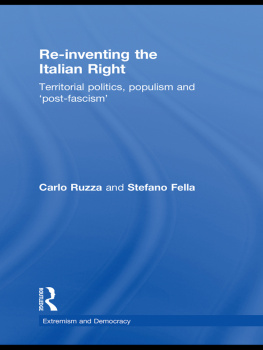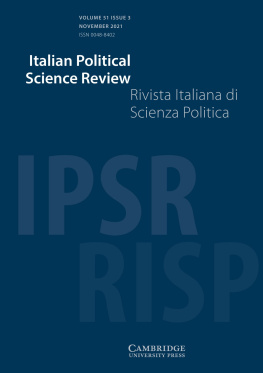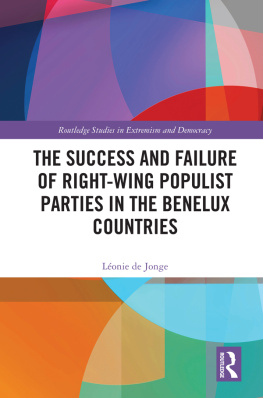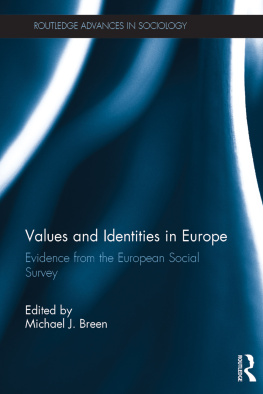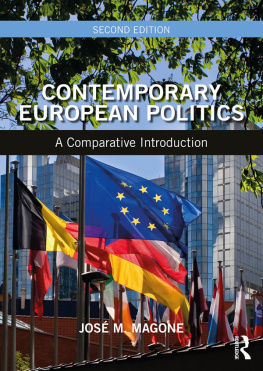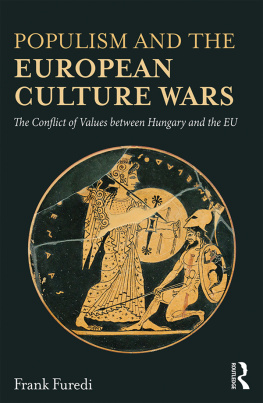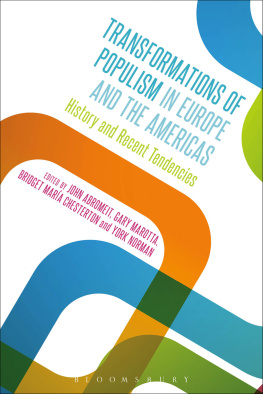
Populism and Heritage in Europe
Populism and Heritage in Europe explores popular discourses about European and national heritage that are being used by specific political actors to advance their agendas and to prevent minority groups from being accepted into European society. Investigating what kind of effect the politics of fear has on these notions of heritage and identity, the book also examines what kind of impact recent events and crises have had on the types of European memories and identities that have been promoted by the supporters of right-wing populist parties.
Based on qualitative fieldwork conducted in six countries, this book specifically analyses how anti-European identities are being articulated by right-wing populist individuals. Providing an analysis of the manifestos, speeches and official documents of such parties, the book examines how they instrumentalize xenophobia, Islamophobia, Euroscepticism, globalization and international trade in European spaces to mobilize the masses hit by financial crisis and the refugee crisis. Drawing on in-depth interviews with the sympathizers of populist movements, Kaya provides some insights into the main motivations of these individuals in resorting to nativist and populist discourses, whilst also providing a thorough analysis of the use of the past and heritage by such parties and their followers.
Populism and Heritage in Europe provides a unique insight into one of the most contested trends of the contemporary age. As such, the book should be of great interest to those working in the fields of heritage studies, cultural studies, politics, sociology, anthropology, philosophy and history.
Ayhan Kaya is Professor of Politics and Jean Monnet Chair of European Politics of Interculturalism at the Department of International Relations, Istanbul Bilgi University; he is a European Research Council Advanced Grant Holder, Director of the Jean Monnet Centre of Excellence, and a member of the Science Academy, Turkey.
Critical Heritages of Europe
Series editors: Christopher Whitehead and Susannah Eckersley
University of Newcastle, UK
The Critical Heritages of Europe series seeks to explore the cultural and social politics of the European past in the present. Bridging theoretical and empirical research, the series accommodates broad understandings of Europe a shifting and historically mutable entity, made both of internal tensions and exogenous encounters, re-imaginings and influences. Heritage too is taken as an expansive paradigm, made in myriad practices where the past is valorized for the present, from folk traditions to museums and memorials, the management of historic sites and traditions, and everyday matters such as education, political discourse, home life, food consumption and peoples relations with place.
Books in the series engage with European heritages in critical times in all senses when Europe and mobilizations of its heritages and memories are called upon to solve problems, and when contests over the meanings of the past are part of wider social and political relations and tensions. Heritage practices are variously informed by civil and uncivil visions, the politics of difference and co-presence, difficult pasts, relations with the outside, borders, margins, and migrations. Critical questions include:
What is the European past made to do in the present and for the future?
What counts as European heritage? To whom, and why?
How and why do relationships with, and attitudes to, the past inform identity positions, social orders and moral values in, or in relation to, Europe?
When and where in the (wider) world do European heritages configure identities?
What are the contemporary meanings and effects of global encounters, mobilities and trajectories in which Europe has played roles?
What theoretical and critical perspectives can be articulated to contribute new understandings of European heritages? How might these be made relevant for current and future heritage practice?
What are the relations between theory, criticality, ethics and heritage practice in the European dimension?
Classical Heritage and European Identities
The Imagined Geographies of Danish Classicism
Lrke Maria Andersen Funder, Troels Myrup Kristensen and Vinnie Nrskov
Heritage and Festivals in Europe
Performing Identities
Edited by Ullrich Kockel, Cristina Clopot, Baiba Tjarve and Mirad Nic Craith
Dimensions of Heritage and Memory
Multiple Europes and the Politics of Crisis
Edited by Christopher Whitehead, Susannah Eckersley, Gnl Bozolu and Mads Daugbjerg
European Heritage, Dialogue and Digital Practices
Edited by Areti Galani, Rhiannon Mason and Gabi Arrigoni
European Memory in Populism
Representations of Self and Other
Edited by Chiara De Cesari and Ayhan Kaya
Populism and Heritage in Europe
Lost in Diversity and Unity
Ayhan Kaya
www.routledge.com/Critical-Heritages-of-Europe/book-series/COHERE
Populism and Heritage in
Europe
Lost in Diversity and Unity
Ayhan Kaya
First published 2020
by Routledge
2 Park Square, Milton Park, Abingdon, Oxon, OX14 4RN
and by Routledge
52 Vanderbilt Avenue, New York, NY 10017
Routledge is an imprint of the Taylor & Francis Group, an informa business
2020 Ayhan Kaya
The right of Ayhan Kaya to be identified as author of this work has been asserted by him in accordance with sections 77 and 78 of the Copyright, Designs and Patents Act 1988.
All rights reserved. No part of this book may be reprinted or reproduced or utilized in any form or by any electronic, mechanical, or other means, now known or hereafter invented, including photocopying and recording, or in any information storage or retrieval system, without permission in writing from the publishers.
Trademark notice: Product or corporate names may be trademarks or registered trademarks, and are used only for identification and explanation without intent to infringe.
British Library Cataloguing-in-Publication Data
A catalogue record for this book is available from the British Library
Library of Congress Cataloging-in-Publication Data
A catalog record for this title has been requested
ISBN: 978-1-138-31332-3 (hbk)
ISBN: 978-0-429-45767-8 (ebk)
Typeset in Bembo
by Wearset Ltd, Boldon, Tyne and Wear
Contents
This book reveals the social, political and economic sources of the populist Zeitgeist in Europe, with a specific focus on relationality between populism and heritage. The work starts with an analysis of the current state of populism and heritage in Europe. Subsequently, it elaborates different aspects of the current political framework, in which populist political rhetoric is becoming strongly rooted at a time characterized by globalism, anti-multiculturalism, financial crisis, refugee crisis, Islamophobia, terror, Euroscepticism, and nativism. This study aims to outline the social, economic, political, psychological and cultural sources of current populist movements in five EU countries (Germany, France, Greece, Italy, and The Netherlands) as well as in Turkey. It also aims to display the socio-economic basis of the populist rhetoric, without falling into the trap of culturalizing what is social, political and economic in origin. Based on in-depth interviews conducted with followers of such populist movements within the framework of a Horizon 2020 Project (CoHERE, Critical Heritages: performing and representing identities in Europe) in the spring of 2017, this book unravels the main motivations of these individuals in resorting to nativist and populist discourses, to understand the use of the past and heritage by such parties and their followers.


